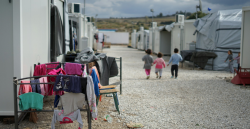Across the world, coronavirus lockdowns have had the unintended consequence of raising the risk of domestic slavery.
But for Lebanon’s migrant domestic workers, the situation was dire well before the pandemic swept the globe.
The Middle Eastern country has been experiencing a deep economic crisis since last year, with a severe shortage of dollars—which the local currency, the lira, is pegged to—and rampant inflation pushing increasing numbers of Lebanese into poverty.
Domestic workers across Lebanon—already routinely abused under the country’s kafala sponsorship system—saw their wages decrease or simply vanish as a result, putting them at additional risk of exploitation.
Now, with lockdown, the danger they find themselves in is critical.
Many find themselves trapped with abusive employers, while those who escape often have nowhere to turn: shelters and embassies are full, and with Beirut’s airport shut, there is no way for them to go home.
Without a lifeline, the risk of exploitation, trauma, and suffering domestic workers face is unprecedented.
Reuters reports:
“I’m very afraid. There’s not a day that I don’t cry… without any money even to eat now,” said Temitope, who climbed down a building after her employer beat her until she bled. She now lives with friends, relying on any cash they can give her.
Like many African and Asian women in Lebanon, Temitope, a mother of two, was recruited for work and came so she could send money home to her family.
But dollar shortages piling pressure on hundreds of thousands of migrant workers in Lebanon have left some stranded in the streets and many begging to go home.
The kafala system, which has been likened to slavery even by members of Lebanon’s government, binds migrant workers like Temitope to their employers and excludes them from the country’s labor laws.
The system has facilitated widespread exploitation and abuse; just last month, an investigation was launched after a Ghanaian domestic worker took her own life after reporting months of abuse.
Zeina Mezher of the International Labour Organization (ILO) argues that the twin crises of the economy and the pandemic have simply exposed the exploitation inherent in the kafala system.
Freedom United has gathered over 85,000 signatures calling on governments around the world to ratify the ILO’s Domestic Workers Convention (C189), a global standard that would require countries to protect domestic workers from the type of abuse they endure in Lebanon.
Stand with workers like Temitope and add your name today.
Read more about the impact of the pandemic on vulnerable domestic workers in Freedom United’s COVID-19 call to action.







Freedom United is interested in hearing from our community and welcomes relevant, informed comments, advice, and insights that advance the conversation around our campaigns and advocacy. We value inclusivity and respect within our community. To be approved, your comments should be civil.